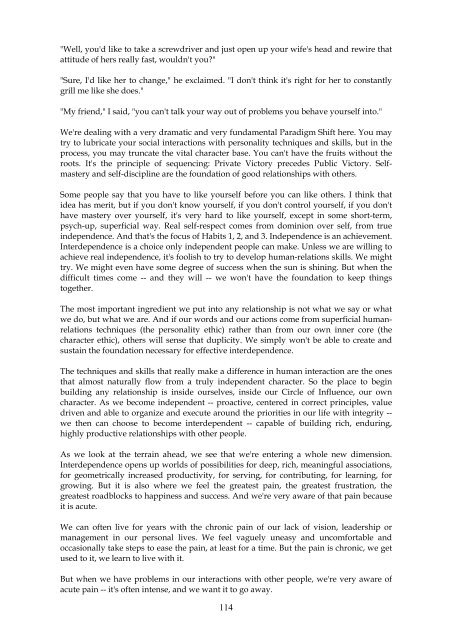Covey - The 7 habits of highly effective people
Create successful ePaper yourself
Turn your PDF publications into a flip-book with our unique Google optimized e-Paper software.
"Well, you'd like to take a screwdriver and just open up your wife's head and rewire that<br />
attitude <strong>of</strong> hers really fast, wouldn't you?"<br />
"Sure, I'd like her to change," he exclaimed. "I don't think it's right for her to constantly<br />
grill me like she does."<br />
"My friend," I said, "you can't talk your way out <strong>of</strong> problems you behave yourself into."<br />
We're dealing with a very dramatic and very fundamental Paradigm Shift here. You may<br />
try to lubricate your social interactions with personality techniques and skills, but in the<br />
process, you may truncate the vital character base. You can't have the fruits without the<br />
roots. It's the principle <strong>of</strong> sequencing: Private Victory precedes Public Victory. Selfmastery<br />
and self-discipline are the foundation <strong>of</strong> good relationships with others.<br />
Some <strong>people</strong> say that you have to like yourself before you can like others. I think that<br />
idea has merit, but if you don't know yourself, if you don't control yourself, if you don't<br />
have mastery over yourself, it's very hard to like yourself, except in some short-term,<br />
psych-up, superficial way. Real self-respect comes from dominion over self, from true<br />
independence. And that's the focus <strong>of</strong> Habits 1, 2, and 3. Independence is an achievement.<br />
Interdependence is a choice only independent <strong>people</strong> can make. Unless we are willing to<br />
achieve real independence, it's foolish to try to develop human-relations skills. We might<br />
try. We might even have some degree <strong>of</strong> success when the sun is shining. But when the<br />
difficult times come -- and they will -- we won't have the foundation to keep things<br />
together.<br />
<strong>The</strong> most important ingredient we put into any relationship is not what we say or what<br />
we do, but what we are. And if our words and our actions come from superficial humanrelations<br />
techniques (the personality ethic) rather than from our own inner core (the<br />
character ethic), others will sense that duplicity. We simply won't be able to create and<br />
sustain the foundation necessary for <strong>effective</strong> interdependence.<br />
<strong>The</strong> techniques and skills that really make a difference in human interaction are the ones<br />
that almost naturally flow from a truly independent character. So the place to begin<br />
building any relationship is inside ourselves, inside our Circle <strong>of</strong> Influence, our own<br />
character. As we become independent -- proactive, centered in correct principles, value<br />
driven and able to organize and execute around the priorities in our life with integrity --<br />
we then can choose to become interdependent -- capable <strong>of</strong> building rich, enduring,<br />
<strong>highly</strong> productive relationships with other <strong>people</strong>.<br />
As we look at the terrain ahead, we see that we're entering a whole new dimension.<br />
Interdependence opens up worlds <strong>of</strong> possibilities for deep, rich, meaningful associations,<br />
for geometrically increased productivity, for serving, for contributing, for learning, for<br />
growing. But it is also where we feel the greatest pain, the greatest frustration, the<br />
greatest roadblocks to happiness and success. And we're very aware <strong>of</strong> that pain because<br />
it is acute.<br />
We can <strong>of</strong>ten live for years with the chronic pain <strong>of</strong> our lack <strong>of</strong> vision, leadership or<br />
management in our personal lives. We feel vaguely uneasy and uncomfortable and<br />
occasionally take steps to ease the pain, at least for a time. But the pain is chronic, we get<br />
used to it, we learn to live with it.<br />
But when we have problems in our interactions with other <strong>people</strong>, we're very aware <strong>of</strong><br />
acute pain -- it's <strong>of</strong>ten intense, and we want it to go away.<br />
114


